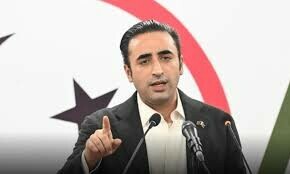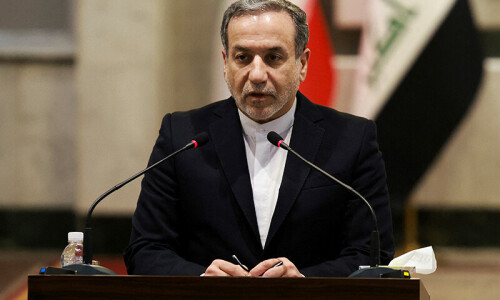SIALKOT: In a sprawling home opposite the golden arches of McDonald’s, the man with the golden touch in this northern Punjab city is quietly and confidently preparing for electoral battle yet again.
Khwaja Asif, the silver-haired PML-N impresario with the signature country drawl, has never lost an election in this wealthy, modern export hub with a politics rooted in the old ways of biradirism.
In 2002, Asif, along with a running mate on a provincial assembly ticket, was the only PML-N candidate in the entire Gujranwala division to win a seat. In 2008, his fourth National Assembly victory on the trot, Asif won by a margin of 40,000 votes, more than twice the number secured by the PPP runner-up.
This time round, Asif has also thrown his hat into the provincial assembly ring – sparking rumours that he may be eying the chief minister’s slot after the election. For all his success, though, Asif continues to deflect credit towards his boss, PML-N supremo Nawaz Sharif.
“Sialkot is PML-N territory. There’s high literacy, low unemployment and the people are low to middle middle-class. They identify with Mian Sahib’s middle-class origins,” Asif explained.
He continued: “Then there’s Mian Sahib’s pro-business policies. He finished the octroi tax, fixed the tax rates and as a result there’s massive, massive amounts of white money here. The business community has a relationship with him.”
All is far from well in Sialkot today, however. Rolling blackouts have left the city without electricity for more hours a day than with. Lengthy queues of vehicles snake around the many CNG filling stations here, when there is any gas left to pump, that is.
Chronic shutdowns at the some 6,000 small and medium enterprises that produce $1.5bn of exports a year has triggered mass layoffs and left owners complaining about the spiralling cost of business.
And there is a growing vein of resentment against Asif’s aloof and autocratic style of politics. “People like N-League, but not necessarily Khwaja Asif,” said NaeemIqbal, a local journalist. “It won’t be so easy for N-League and Khwaja to win this time.”
POWER POLITICS: Withering as the energy crisis has been for Sialkot’s economy and everyday life, a paradox quickly becomes apparent: its effect on constituency politics appears to be negligible.
A group of locals debating the electricity and gas shortages were fiercely critical of the impact on the average Sialkoti’s livelihood and daily life, but, to a man, they were also sure individual candidates would not be blamed.
“We have a caretaker government now and the power crisis is worse than ever. If they (elected politicians) did have the resources, who would be crazy enough to be abused for not using the resources?” one Sialkot resident asked.
Even owners of small- and medium-sized enterprises and exporters, while expressing frustration at the deepening energy crisis, see the crisis neither as a compelling reason to push harder for a PML-N-led federal government nor as grounds to punish the PML-N for allowing the PPP to complete an unprecedented full term.
According to Musharraf Iqbal Khwaja, a hi-tech sports apparel exporter: “At the end of the day, we’re businessmen and focus on self-interest. There is no love for anyone or any party. We just see who has the best industrial and business policy.”
For Khwaja, and many others in the hugely influential chamber of commerce here, the best option still remains the PML-N. “In 66 years, if there has been a government that has done some good, it was during the two terms of Sharif in the 1990s,” Khwaja said.
OPPONENTS DIVIDED: Complex as the politics of Sialkot city is – biradiris play a significant role as do the many business families – it can also be reduced to a simple equation: add the devotion of the electorate to Nawaz Sharif and subtract the unease felt towards KhwajaAsif to determine the margin of Asif’s eventual victory.
“Khwaja Asif doesn’t let party workers and ordinary people near him. He only has time for investors, people who can put money in his campaign,” said Saleem Kalamkar, a local journalist. “And the investors don’t do it out of love. They are scared because they know if he wins, he can set the labour department and other agencies loose on their factories.”
Imran Ashraf, a former Asif protégé and two-term MPA who recently quit the PML-N and joined the PTI to take on Asif, said: “The PML-N always wins here because no other party contests against them. The voters haven’t had a genuine alternative, a strong candidate to choose.”But the PTI, which has set its sights on the city seats (NA-110, PP-122 and PP-123), is hamstrung by uncertainty over ticket allocation. Ashraf, who is vying for the PTI ticket in NA-110 with Usman Dar, a 38-year-old first time politician, said:
“It’s unfortunate. People should have been nominated a month ago. As a new party, PTI has to go out and target all voters. The established parties only have to target people who are unhappy with them.”
Over at his campaign headquarters, Dar, surrounded by posters advertising him as the PTI candidate for PP-122, believes he has now secured the ticket for NA-110: “It’s like this: until last week, Ashraf was on NA-110, but then the decision was reviewed and the party decided I would be the better candidate.”
Dar added: “I think the decision is final. I saw a ticker on TV yesterday.”
Less encumbered by uncertainty over tickets is Arshad Mehmood Baggu, the Jamaat-i-Islami candidate for NA-110 who won an MPA seat in 2002, but stayed out in 2008 because of the JI’s nationwide boycott.
“The PTI will be a big factor,” the fast-talking Baggu said. “But the contest will be between me and Khwaja Asif.”
While wary of predicting victory, Baggu does think he has an ace up his sleeve: “The PPP came to me and said that we (the PPP) can’t defeat Khwaja Asif. So we’ll support someone who can. Firdous Ashiq Awan will withdraw her papers before the election and will support me.”
Awan, whose base is a neighbouring, rural constituency of Sialkot, is the final piece of the likely major opposition to Khwaja Asif.
Unable to find a strong candidate in NA-110 but having bagged 32,000 votes in the last election, the PPP high command has drafted in Awan to contest against Asif, in addition to her preferred seat, NA-111. Awan, though, is unsure if she will eventually contest both seats.
For Asif, seeing the popular PTI a house still divided and recognising the implausibility of the JI and PPP working together to unseat him, it is already time to start thinking about the future.
“In another five years, a new leadership (of the PML-N in Sialkot) should arise. I’ve had a long time. It’s about time,” Asif said.











































